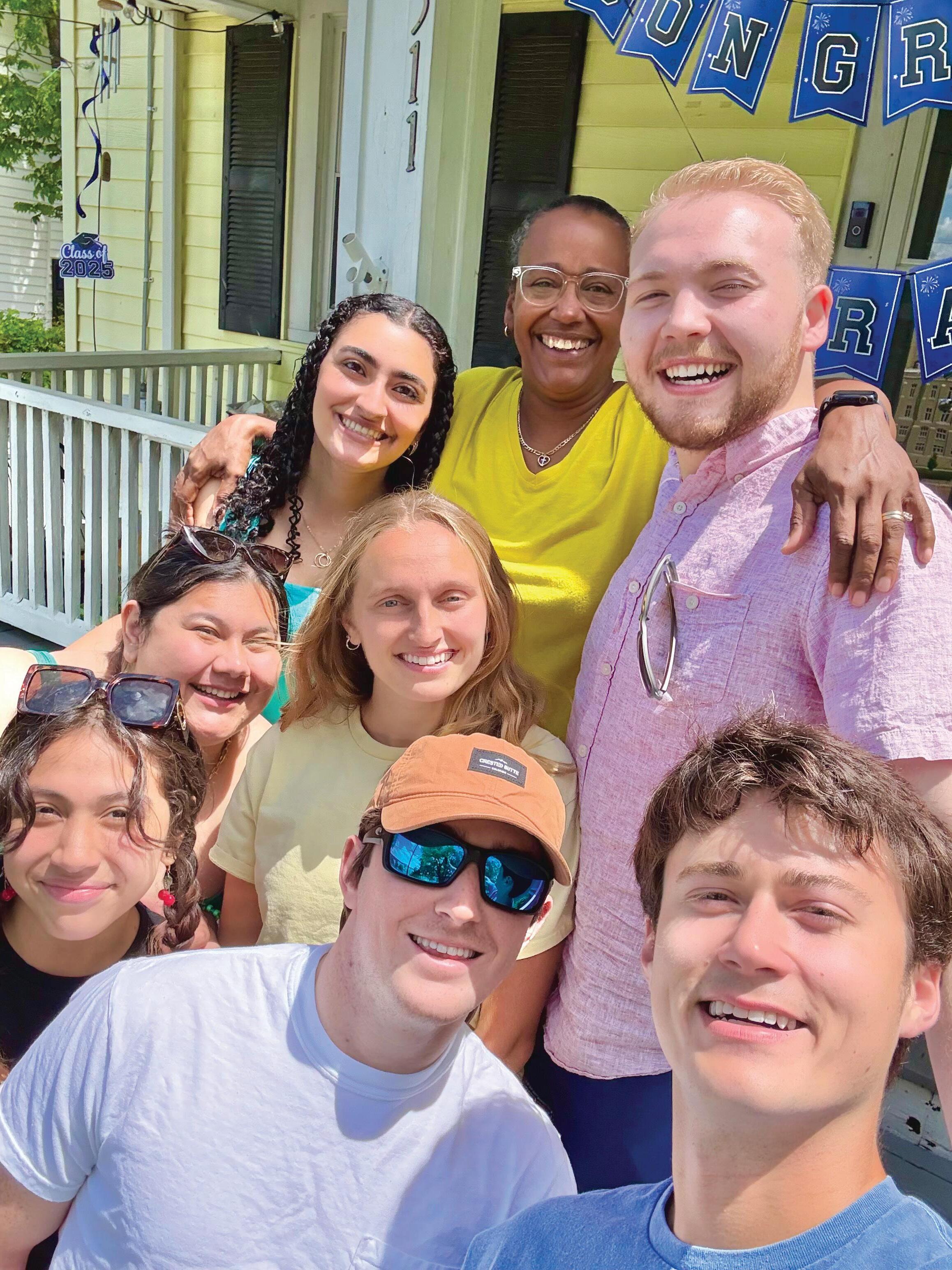

Shepherd Program
BY THE NUMBERS
93 126
Volunteer Venture Participants Students in the Gateway Course
11,243
Bonner Service Hours
43
Summer Interns
35
Graduated Minors
916
CKWL Backpack Program Recipients
The Art of Respect
The Shepherd mission: To understand and address the causes and consequences of poverty and inequality in ways that respect the dignity of every person.
Shepherd is — and always has been — dedicated to the dignity of every person. As I say on the first day of class, we can disagree about almost anything. But there is one thing we will not debate: People matter.
Smart, good people can, however, and often do, disagree about what respect for the dignity of every person demands. In particular, smart, good people disagree over which public policies or private practices to support.
Why? No doubt for many reasons. But often our disagreements boil down to different answers to three key questions. Is the proposed policy or practice:
1) Practically effective? Someone may share my desire for certain improvements (e.g., to health, education, income), but they don’t think my approach will work (well enough). Predicting the future is rarely easy. Therefore, their lack of support for my approach need not mean they don’t care.
2) Morally permissible? Someone may share my belief that my approach would work, but they don’t think it balances the competing claims on us (well enough). Figuring out what we should do when we can’t help everyone in every way at every moment is a challenge. Therefore, their lack of support for my approach may simply mean they think we should focus, instead, on some other approach, some other outcome, even some other group.
3) Politically feasible? Finally, someone may share my belief that a particular approach would be practically effective and morally permissible if implemented, but they don’t believe it will be implemented. Therefore, their lack of support for my approach may mainly signal their sense of what we can actually accomplish.
Our world needs smart, good people, especially those who know how to work with one another despite disagreements. If you believe in a better, more just world — one that respects the dignity of every person — then come join us here in Shepherd.
Whatever your background, beliefs, major, career path or political perspective, we need you. Our world needs you.
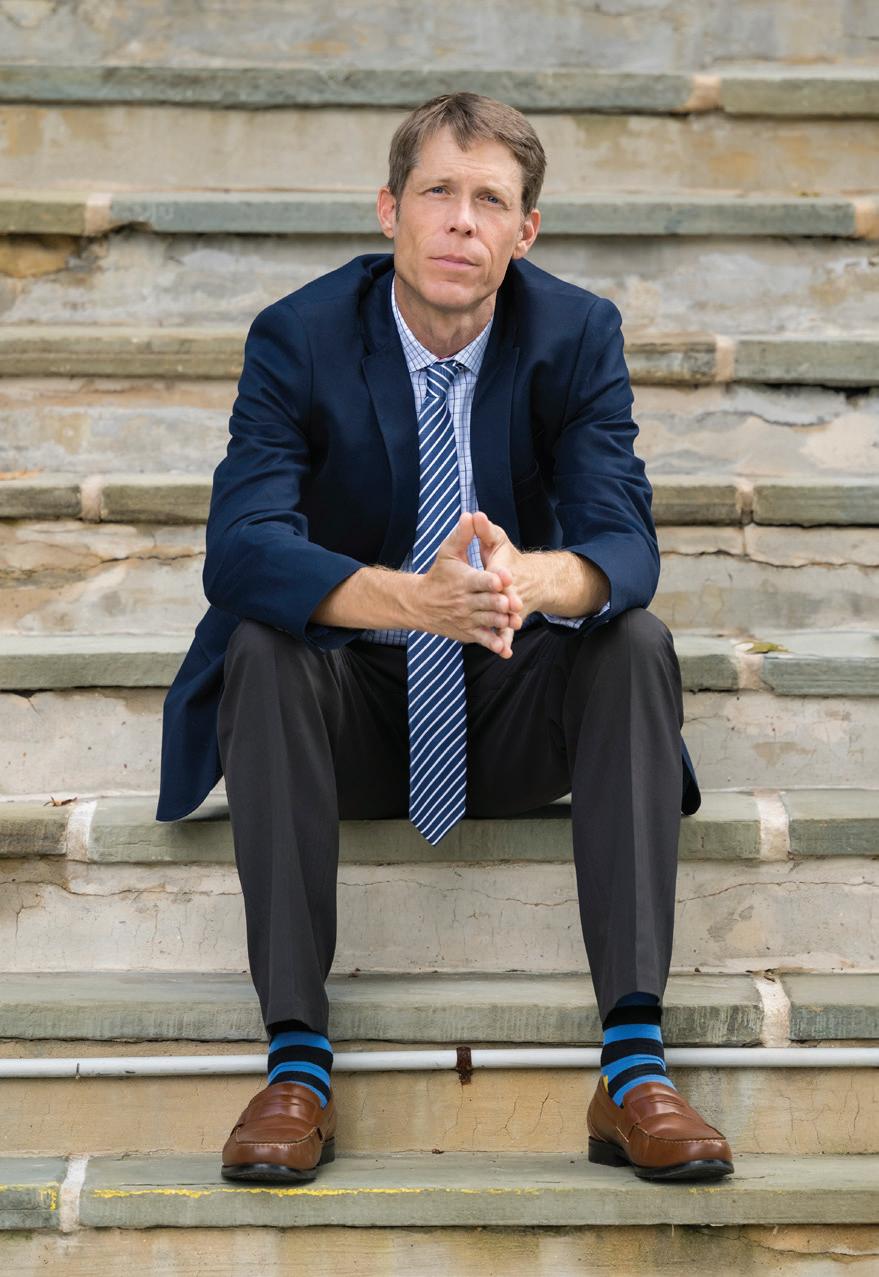
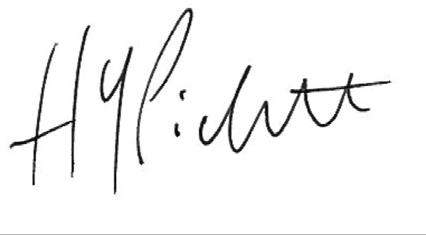
—
Howard Pickett
Director of the Shepherd Program Associate Professor of Ethics and Poverty Studies
education & perspectives
Students’ Voices ACADEMICS AT W&L
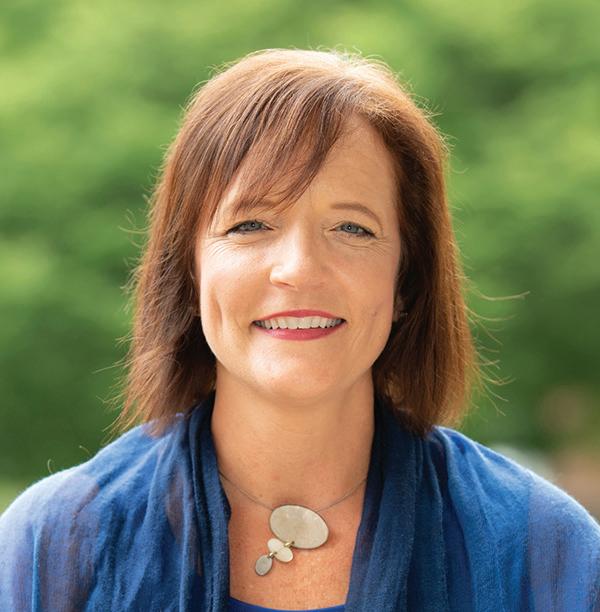
FILM/SOAN 273
Creating Field Documentary on Human Rights in Ghana
“Prof. Stephanie Sandberg
Working with Shepherd Program students on our field documentary course in Ghana has been one of the most rewarding experiences of my teaching career. What sets these remarkable students apart is their extraordinary combination of sensitivity, attentiveness, thoughtfulness and unwavering drive that makes them ideal collaborators in human rights work. Unlike many students who approach international experiences with preconceived notions, Shepherd students arrive in Ghana with a deep understanding of complex social, economic and political structures through their interdisciplinary coursework. They jump wholeheartedly into the documentary creation process, asking probing questions that demonstrate their genuine commitment to amplifying the voices of grassroots organizations, never faltering in their dedication to creating meaningful documentaries that serve our NGO partners. Their enthusiasm and intellectual rigor continuously inspire me to be the best educator I can be, reminding me why the Shepherd Program's unique integration of academic study with experiential learning produces graduates who are truly prepared to address the world's most pressing humanitarian challenges.” n
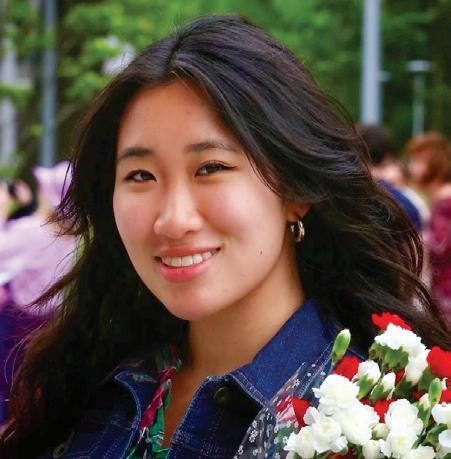
POV 423
Poverty and Human Capability: A Research Seminar
Lizzy Nguyen
’25
To round out my POV minor, I took POV 423 in Fall Term of my senior year with professor of economics Art Goldsmith. In this capstone class, we were given the opportunity and guidance to explore a topic of our choice. At W&L, courses like Medical Ethics (PHIL 346) and experiences like my Shepherd Internship in Utica, New York, and health services research with the Penn Leonard Davis Institute of Health Economics naturally led to mine: harm reduction. Controversial yet close to my heart, it was the perfect framework to combine my passion for mental health and well-being with Shepherd’s lessons on promoting dignity.
Throughout our largely self-driven semester, class meetings were discussion-based. We would share about our individual projects for feedback at different checkpoints, and I loved watching our diverse topics evolve from day one to the final presentation. Another major highlight was the Shepherd faculty who visited to share about their interests. As a neuroscience major who applied straight to medical school and spent a full Winter Term abroad studying global health, I could only take so many W&L classes that piqued my interest. However, I’m grateful for these snapshots into different avenues – with topics ranging from welfare reform and dependency work with Melina Bell in philosophy to environmental funding with Jamie Casey in economics, these talks (and our own presentations) captured how truly interdisciplinary Shepherd is in both thought and practice.
My POV 423 capstone was a testament to four years of the most insightful and life-changing lectures, experiences and company. As a key reason behind my decision to attend W&L, the Shepherd Program both defined my W&L experience from start to finish and shaped my next steps towards medicine and public health. Moving forward, my approach to promoting health equity will feature two crucial parts: a broad understanding of the macro-level systems shaping modern-day disparities yet a deeply personal, empathetic and human approach to my future relationships. n
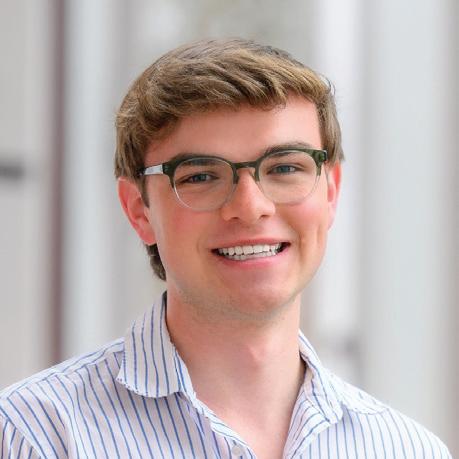
SOAN 265
Exploring Social Networks
Trip Wright ’25
The first course I took toward my sociology and anthropology degree at W&L was Exploring Social Networks with Professor of Sociology Jon Eastwood. This course was my first time reading sociological theory literature, in this case, pertaining to social networks, working with the programming language R and conducting more advanced statistical methods like ordinary least squares (OLS) regression and network-level regression. Exploring Social Networks causes you to think about how the structure of social networks affects the individuals who reside within them, considering how we access information, social capital and the potential for mobilization. The course asks how individual behavior can dictate the shape of networks, examining how networks can exhibit segregation and create or reinforce inequality. You’re forced to conceive of social life in new ways, how data can be leveraged to make sense of relationships and their benefits.
There were many relevant applications to the poverty and human capability studies minor and the Shepherd Program. I remember discussing how poverty can be conceived of a depreciation of monetary capital and social capital. We get bonding capital (trust, solidarity, norm enforcement) and bridging capital (information, opportunities, creative outlets) from social relations. Developing a sense of trust through your social network may make it easier to ask a neighbor to collect your mail while out of town — or learn of a new job opportunity that helps with upward mobility. These outcomes of social networks are privileges.
My honors thesis applied theory of social networks when considering how existing public transportation infrastructure operates in cities, a topic I wrote about in my Shepherd capstone. I argue that the genius of cities is that they are places where people of many backgrounds come together, with diversity as a strength from which social capital benefits are derived. However, American cities are segregated, limiting exchange between people of different backgrounds, and investigate the extent to which public transit can ameliorate this separation.
Exploring Social Networks was a class of “firsts” and set me on a path of using data to answer questions about the social world. n

ENGL 244
Health, Care, and Compassion on Stage
and
Screen Olaide Olatunbosun ’26
The title alone caught my eye. As a cognitive and behavioral science major and a POV minor, I was interested in taking this class to gain a deeper understanding of the social context that influences healthcare and media. This class allowed us to take a more human-centered approach to understand that care, wellness and illnesses are not just medical issues but also social, emotional and moral experiences that shape our dayto-day narratives. Through the lens of plays and films, we were able to understand health as a social justice issue and view the characters beyond their illnesses and disabilities.
I had two favorite works of art: William Shakespeare’s ‘King Lear’ and the adventure/comedy movie, ‘The Peanut Butter Falcon.’ These two productions were a way for students to explore how various perceptions of health, dignity and suffering influence the systems in place today and our real-world attitudes. Through these films, we were able to see past statistics and stereotypes. We encountered themes such as brotherhood, friendship, explorations of madness and down syndrome, family relationships, and quality of health care. I will never forget the engaging conversation and chemistry — Professor Holly Pickett’s careful selection of each production was amazing!
One major highlight was viewing of ‘King Lear’ on stage at the American Shakespeare Center's Blackfriars Playhouse in Staunton and our discussion on the relationship between the principles of care and this play. Through this class I discovered my love of stage plays. From the annotations of the texts to the breakdown of every play and film, it was an invaluable experience that connected how media shapes societal views as it relates to health and suffering. These connections helped us better understand the reflections of inequality that are affected by class, race, access to care and quality of care. This class gave us insightful information on how individuals are perceived by the world in media. Taking a more critical and analytical dive gave little room for us to overlook the experiences of those with mental illnesses or those from marginalized backgrounds. This influenced how we deepen our empathy, respect and autonomy of individuals. My excitement from taking this class has only grown. As I look to pursue a career in health care, I will take these experiences and apply them to the real world, which is the most beautiful aspect of Shepherd! n
COURSEWORK FOR CREDIT
Course
Title
Faculty
ARTH 274 Art and Revolution: Mexican Muralism Lepage
ARTH 276 Chicana/o Art and Muralism Lepage
AFCA/ENGL 265 Constructing Black Lives in Film and Literature Wingard Cunningham
BIOL 275 Food for Thought Blythe
BUS 381 Social Entrepreneurship Landry
CBSC 329 Stereotyping, Prejudice, and Discrimination Woodzicka
ECON 235 The Economics of Social Issues Goldsmith
ECON 241 Economics of War and Peace Silwal
ECON 280 Development Economics Casey
ECON 376 Health: A Social Science Exploration Blunch
EDUC 230 Educating Citizens for Democracy Moffa
EDUC 235 Educating for Global Citizenship Moffa and Sigler
ENGL 244 Health, Care, and Compassion on Stage and Screen Pickett
ENGL 260 Literary Approaches to Poverty Chowdhury
ENGL 376 Postcolonial Literature and Theory Chowdhury
ENV 282 Commodification of Nature Betancourt
ENV 295H Topics: Environmental Justice in Appalachia McCoy
ENV 295I Topics: Indigenous Ethnogeography and Foodways Passidomo
FILM/SOAN 273 Creating Field Documentary on Human Rights in Ghana Brown and Sandberg
HIST 195F Transgender History Rosenthal
HIST 211 Scandal, Crime, and Spectacle in the 19th Century Horowitz
HIST 269G Borderlands, Empires, and Encounters Sammons
HIST 269K African Women in Comparative Perspective Ballah
HIST 269L Introduction to Black Women’s History Dennie
HIST 289C Liberia and the American South Ballah
HIST 309 The French Revolution Horowitz
HIST 369D Slavery & Capitalism Sammons
HIST 395E Educating Otherness Green
JOUR 295Q Feminist and Queer Media Studies Grover
LJS 297B Should Race Matter? Dean
PHIL 260 Political Philosophy: The Social Contract Taylor
PHIL 296I Sem: Images of Justice Levit Ades
PHIL 296J Philosophy of Disability Levit Ades
PHIL 346 Medical Ethics Taylor
PHIL 365A Food Ethics McCoy
PHIL/POV 249 Poverty, Oppression, and Privilege Pickett
POL 232 Public Policy Harris
POL 295L Public Opinion and Political Behavior Virgin
POL 388 Architecture of Urban Community LeBlanc
POV 101 Introduction to Poverty and Human Capability Bell, Eastwood, Pickett and Robinson
POV 102 Introduction to Community Based Poverty Studies Davidson
POV 192 Blue Ridge Mile Training Elrod
POV 193 Blue Ridge Mile Clinic Elrod
POV 197 Bonner Program Charley
POV 202 Respect, Community, and the Civic Life Charley
POV 295 (LAW 621) Child Abuse and Neglect Hammond
POV 423 Poverty and Human Capability: A Research Seminar Goldsmith and Pickett
REL 195F Topics: Race, Religion, and Resistance in America Clark
REL 295J Topics in Religion: Exodus and Politics Filler
SOAN 202 Contemporary Social Problems Jones
SOAN 216 Belonging in College Chin
SOAN 227 What is Power Perez
SOAN 228 Race and Ethnic Relations Robinson
SOAN 231 (de)Constructing Disability in the U.S. Sutton
SOAN 242 Sociology of the Black Elite Robinson
SOAN 244 Personal Networks and Social Capital Eastwood
SOAN 263 Poverty and Marginality in the Americas Perez
SOAN 280 Gender and Sexuality Oubou
SOAN 290C Producing Culture from the Margins Sutton
SOAN 290I Topics: Qualitative Methods as a Social Justice Practice Jones
SOAN 291Q Global Migration Oubou
SOAN 291T Racial Integrity, Eugenics, Immigration Bell
SOAN 395 Senior Seminar in Quantitative Analysis Eastwood
SOAN 396 Senior Seminar in Qualitative Analysis Oubou
CAPSTONES
Leela Addepalli ’25
“Stolen Childhoods”
Mohammed Albotabeekh ’25
“The Educational Outcomes of Establishing Charter Schools in LowIncome Suburban Neighborhoods”
Melos Ambaye ’25
“The Cost of Censorship: How Russia’s Structures of Silence Undermine Human Rights and Threaten Global Stability”
Kristina Ayers ’25*
“The Impact of Poverty and Marginality on Health Disparities and Outcomes in North American Indigenous Populations”
Stephanie Boktor ’25
“Invisible Yet Essential: The MENA Immigrant Experience in the U.S.”
Lela Casey ’25
“Hallways to Battlefields: Military Recruitment in Low-Income Communities”
Sai Chebrolu ’26
“Designing a Hunger-Free America: A Contractualist Case for Expanding School Meals, Restoring Dignity, and Advancing Food Justice for Children”
Janae Darby ’25
“The Architecture of Exclusion: A Roadmap to Dismantling Statelessness”
Ruthie Hay ’26
“Investigating Poverty’s Role in Child Development”
Avani Kashyap ’25
“Analyzing How Trust Should Evolve in an Increasingly Digitized, Patient-Centered Health Landscape”
Madison Lilly ’25
“Medication in the Mountains: Barriers to MAT for OUD Recovery in Rural Appalachia”
Zainab Madan ’25
“Branches of Healing: Exploring the Role of Nature Therapy on Well-being"
Gabe Miller ’25*
“Ethical Considerations for Financial Sanctions in Criminal Punishment”
Charlie Mlcek ’25
“Balancing Progress and Peril: The Moral Imperative in Advanced AI Development”
Lizzy Nguyen ’25
“The Right to Heal: Ethics and Outcomes in Modern Approaches to Addiction”
Amanda Romano ’25
“Analyzing Stereotype Threat in the Classroom”
Rachel Romano ’25
“Adverse Childhood Experiences, Rurality, and the Moderating Role of Education”
Ryan Schwartz ’25
“Bridging the Gap: The Harm of Unequal Access to Dental Care”
Alec Sirois ’25
“Children Are Not Tourist Attractions: The Systemic Exploitation of Vulnerable Children Through Orphanage Tourism”
Parker Sparks ’25
“Arts Integration: An Encouraging Approach to Ensuring Student Access to the Arts”
*Indicates a capstone project completed outside of POV 423
Kiera Stankewich ’25
“Tangata Whenua: Reclaiming Māori Rights in Aotearoa”
Jalen Todd ’25*
“Kairos in Action: How Global Actors Manage Risk and Poverty in the Conflict Zones of the Democratic Republic of the Congo”
Shannon Tozier '25*
"Return on Inclusion: Investigating the Economic Impacts of Disabled Student Enrollment in Higher Education"
Liv Ullmann ’25
“Tuberculosis in Prisons: Public Health Injustices in ‘Private’ Spaces”
Aishwarya Vemagiri ’25
“Assessing the Effectiveness of Comprehensive Sexuality Education Programs on Reducing Male Perpetrated Sexual and Domestic Violence”
Ignas Volcokas ’25
“Gig-economy, Algorithmic Management and the Future of Labor”
Michael Wang ’25
“Algorithmic Justice: Reimagining Equity and Trust in Healthcare through Artificial Intelligence”
Ava Wilkes ’25
“Clearing the Air: The Past and Future of Menthol in America”
Sofia Zarazua ’25*
“Unveiling Invisibility: Native American Disparities and the Politics of Marginalization”
community engagement
VOLUNTEER VENTURE
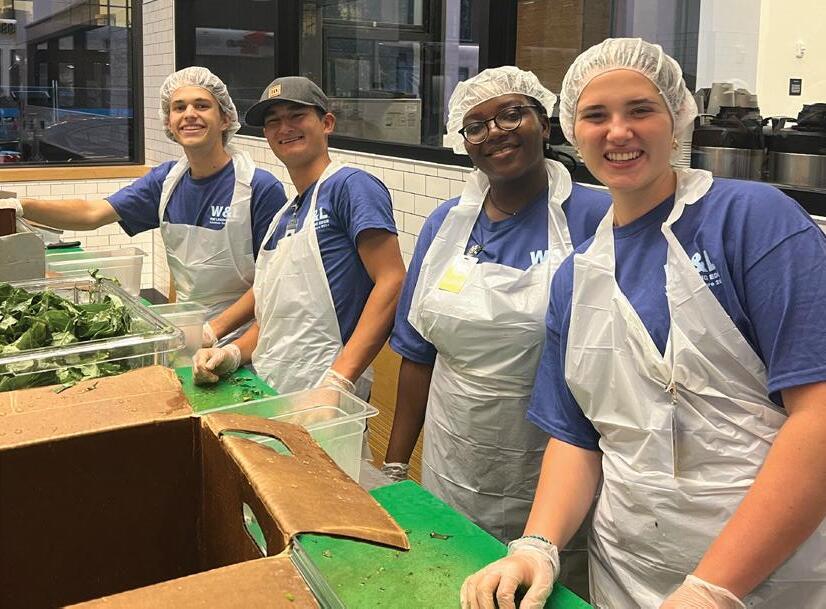
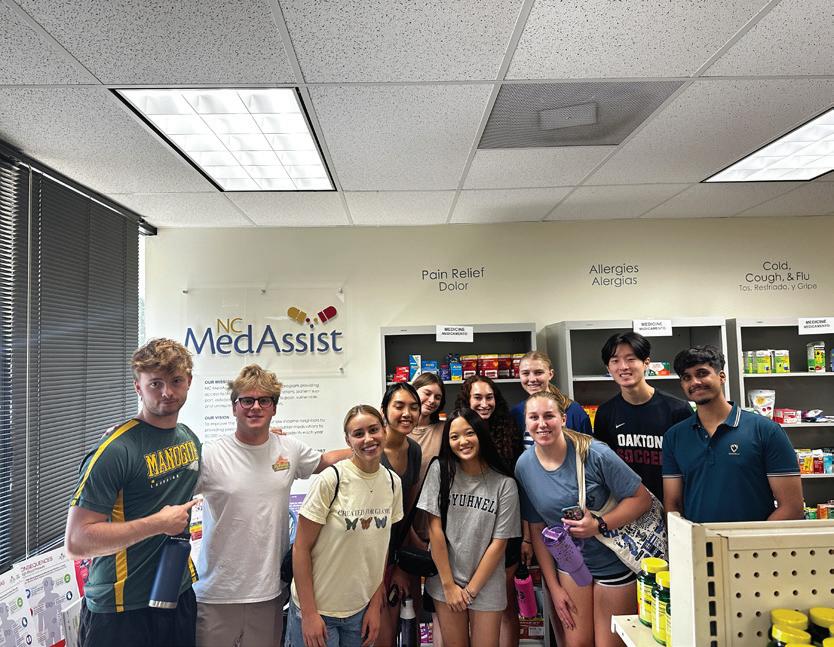
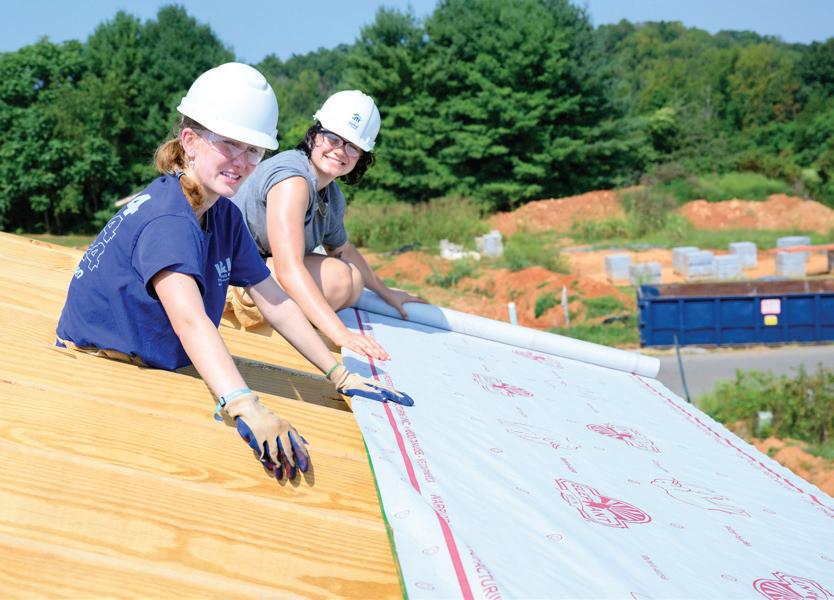
Volunteer Venture (VV) is a service-learning Leading Edge program for incoming students. Sponsored by the Shepherd Program, VV allows participants to build meaningful relationships and explore issues related to poverty, injustice and opportunity through service with community-based agencies, guest speakers, and group discussions related to a thematic issue. Topics for the experience include food and housing insecurity, law and justice and the social determinants of health. n
8 Trips | 7 Cities | 32 Peer Leaders | 93 First-Year Participants
Service.
I really enjoyed getting to learn more about the area we were serving and getting to see how impactful the work we were doing was, not just for the people it directly impacted but for the greater community as well.”
— VV 2024 Trip Participant
Learning.
I absolutely loved how our participants interacted with clients and service site representatives! Over the course of the week, I could see comfort building, relationships strengthening and reflection deepening. During the discussions, participants were able to connect with their service in a meaningful manner and were asking questions from a place of respectful curiosity.”
— VV Leader Morgan Schuckman ’27
Community.
Volunteer Venture to me is about connecting with passionate individuals who are dedicated to creating positive change in society. This has allowed me to forge meaningful friendships and create unforgettable memories."
— VV Leader Jackson Parker ’25
The VV Public Health trip to Charlotte, North Carolina, volunteered at NC MedAssist.
Student participants prepare food at the D.C. Central Kitchen with trip leader Grace Rustay ’27.
Rockbridge Area Habitat for Humanity hosted the local Volunteer Venture trips. Pictured are Libba Huff ’28 and trip leader P Barnes ’25.
community engagement
CAMPUS KITCHEN
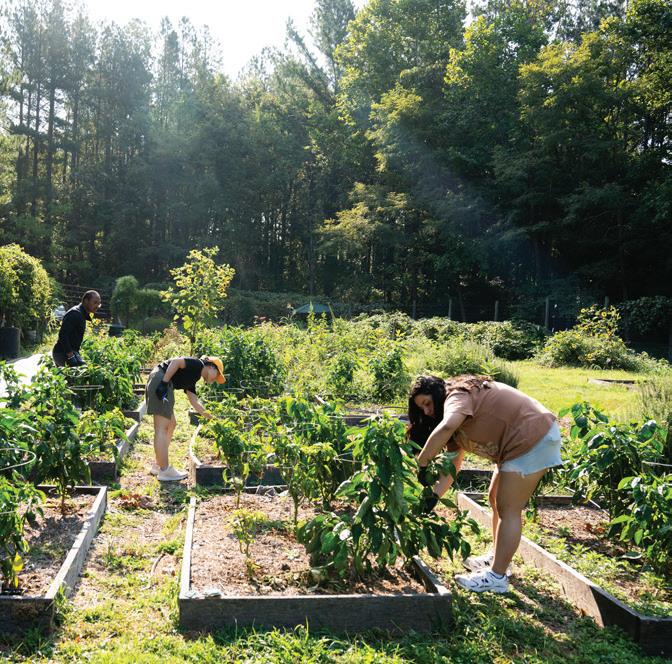
Strengthening Bodies.
The mission of the Campus Kitchen at Washington and Lee (CKWL) is to strengthen bodies, empower minds, and build communities through food. Student leaders coordinate food preparation and delivery logistics, attend events and discussions, and work with staff to facilitate financial stewardship and development for the organization. n

Building Community.
At CKWL, we promote nutrition and address the issues of food waste and food insecurity in Lexington and Rockbridge County. We work toward this by transforming food that would otherwise go to waste into balanced meals for low-income members of the community as well as collaborating with community organizations to provide groceries through our Mobile Food Pantry, Backpack and Produce Delivery Programs.
Meals Delivered: 11,760
Nutrition Education Instructional Hours: 3,903
Pounds of Groceries Distributed: 31,500 Backpacks: 24,978
Empowering Minds.
We collaborate with other student organizations at W&L and the wider Rockbridge County in joint events around relevant topics to the food system. During students’ time with CKWL, they develop meaningful relationships with clients that go beyond service. Our students learn to think critically about the variety of ways that they can have a lasting impact within our community by supporting existing organizations and projects.
Volunteer Hours: 4,616
#HungerFighters Cohort Members: 17
Campus Kitchen Leadership Team Members: 37 Just Food Series Unique Attendees: 231
This year, members of the Campus Kitchen Leadership Team participated in the development of the organization’s next three-year strategic plan. In a project led by Kiera Stankewich ’25, Emma Scott ’26, Cece Eklum ’26 and LeAnna Baker ’26 students interviewed community stakeholders, reviewed data and evaluated available resources to identify existing and emerging community needs that Campus Kitchen is well poised to address. This project highlights the hands-on experiences that Campus Kitchen offers in the realm of nonprofit management.
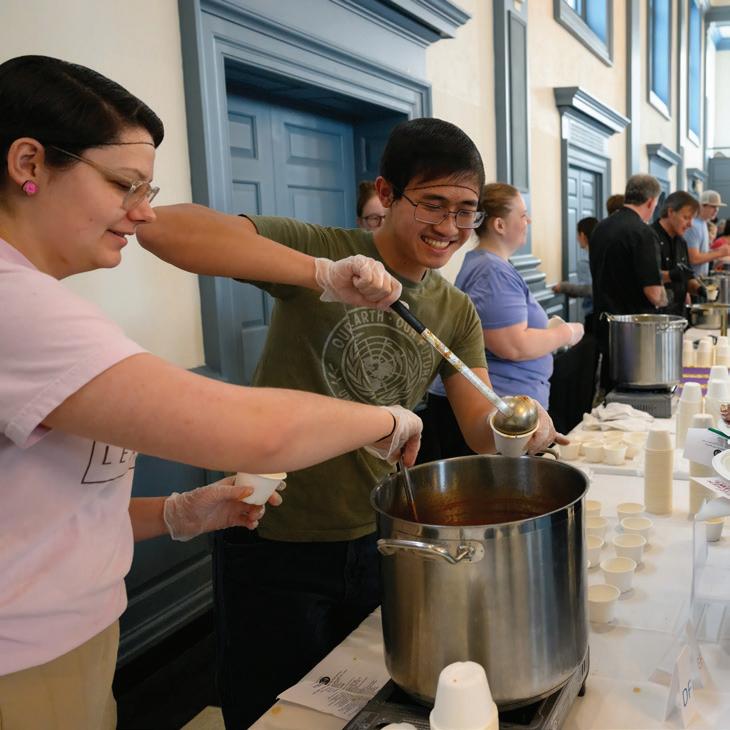
Students sample soups at Campus Kitchen’s 13th annual Souperbowl fundraiser. This fundraiser brings together restaurants, caterers and other community organizations to support the Campus Kitchen Backpack Program.
Students on the Lexington Volunteer Venture trip assist with growing produce for Campus Kitchen in the W&L Campus Garden.
First-year Bonner Students pack meals with Campus Kitchen over Washington Break.
BLUE RIDGE MILE
Clinic.
The Blue Ridge Mile (BRM) at Washington and Lee University, established in 2020, assists clients in acquiring or maintaining Virginia driving privileges, which can be difficult due to hefty requirements, confusing rules, difficulty obtaining necessary documents and lack of finances. BRM advocates help clients navigate the process, access resources and offer encouragement. In 2024, there were five active advocates that served 29 unique clients. n
Blue Ridge Mile’s vision statement, developed by students, reflects the core values of the Shepherd Program: The Blue Ridge Mile clinic envisions a community where individuals facing barriers to obtaining or reinstating a driver's license are empowered to overcome systemic challenges and achieve mobility with dignity. Through dedicated outreach efforts, we aim to illuminate and dismantle the systemic barriers that hinder individuals from obtaining or reinstating their driver’s license. Our commitment extends beyond mere assistance; we strive to foster a supportive environment where clients are empowered to navigate the complexities of the legal processes involved by creating innovative solutions to everyday problems faced by our community.
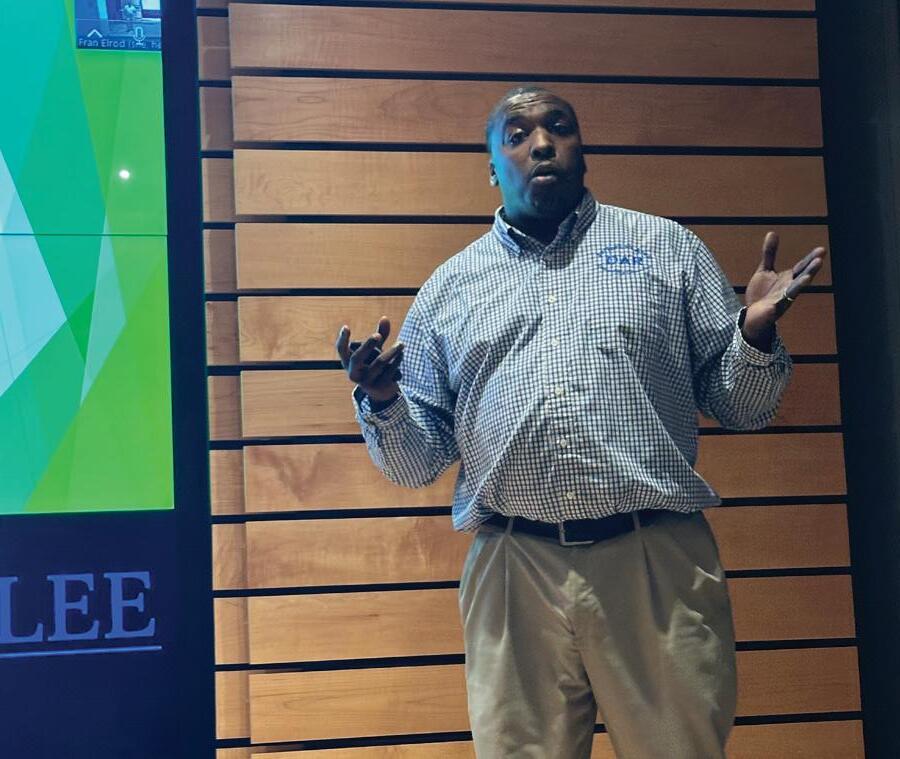
Primary Types of Referrals
17 did not have a license
12 had their licenses suspended or revoked
3 were driving without insurance
Student Organization.
Gabe Miller ’25 served as the student organization chair and organized two campus speaker events: Samantha Wood with the National Alliance to End Homelessness and Gary Spry with Offender Aid and Restoration. The group also attended the annual banquet for Drive-ToWork in Richmond, Virginia, and later returned to the capital city for a tour of the Virginia State Capitol and discussion with staff at the Legal Aid Justice Society.
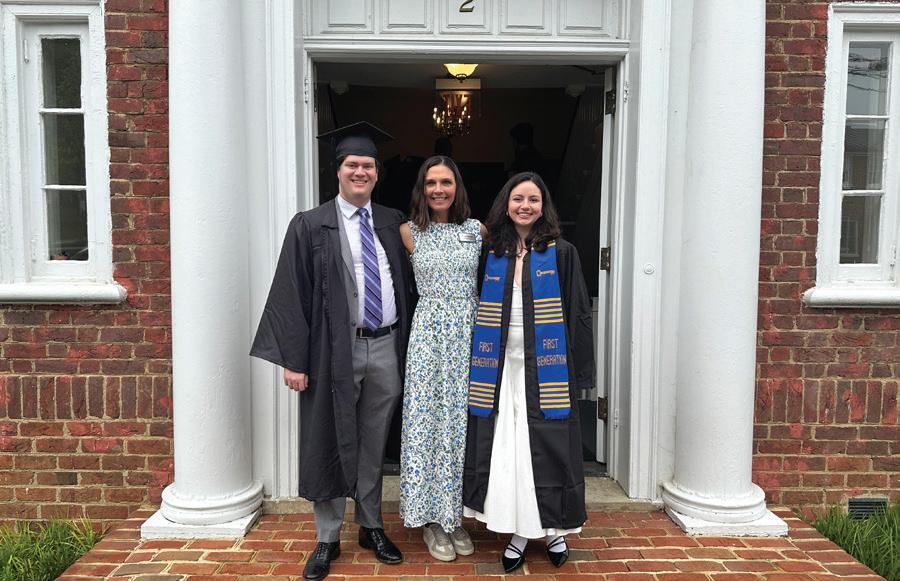
Graduation Day with Gabe Miller ’25, student organization chair, Fran Elrod, adviser and Jana Hulsey ’25, service chair.
Gary Spry presented on re-entry services offered by Offender Aid and Restoration.
community engagement
NABORS SERVICE LEAGUE
Educational Programming.
The Nabors Service League, in collaboration with community-based agencies, connects students with opportunities to learn, serve and reflect on issues of poverty and justice. The student leadership team is comprised of committees: Local Service, Educational Programming, Alternative Breaks, Friends of Nabors and Good Nabors Mentorship. n
NSL’s educational series focused on issues related to access. The series included a faculty panel on voting rights in the fall moderated by Carmen Marley ’27 and two virtual alumni panels in the spring. “The Access: Immigration” panel featured Erin Mo Ferber ’18, Julio Leon ’21 and Chris Washnock ’12 and was moderated by Avani Kashyap ’25. “The Access: Reentry” panel featured Balen EssakHernandez ’20, Kate LeMasters ’15, Charles Allen ’99 and was moderated by Gina Kuah ’27.
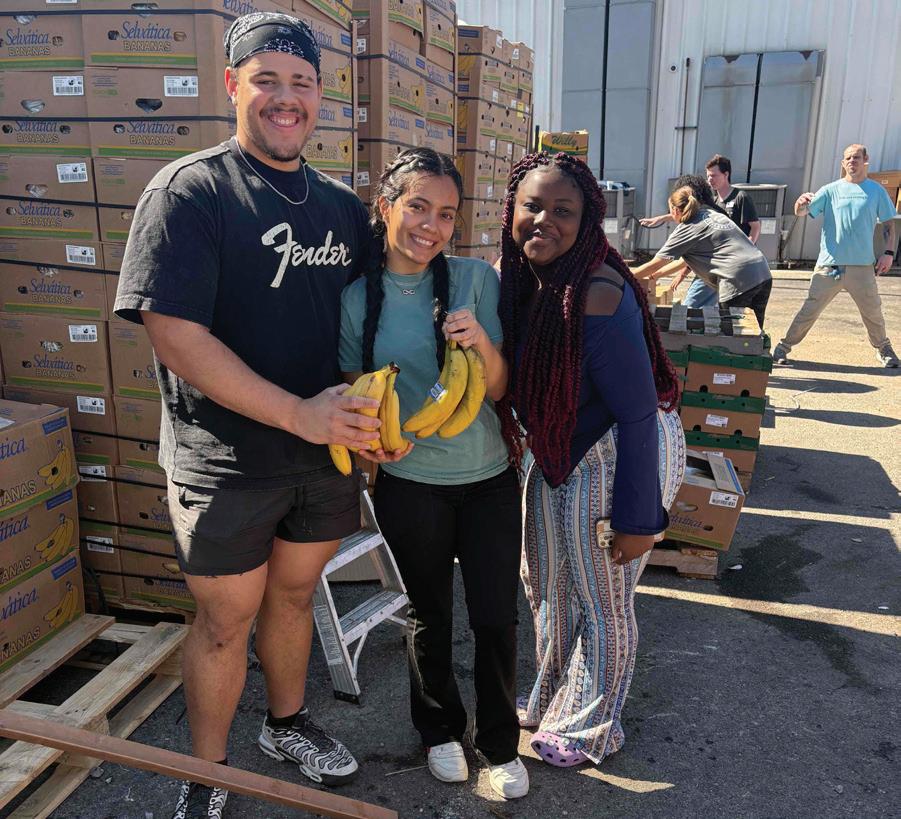
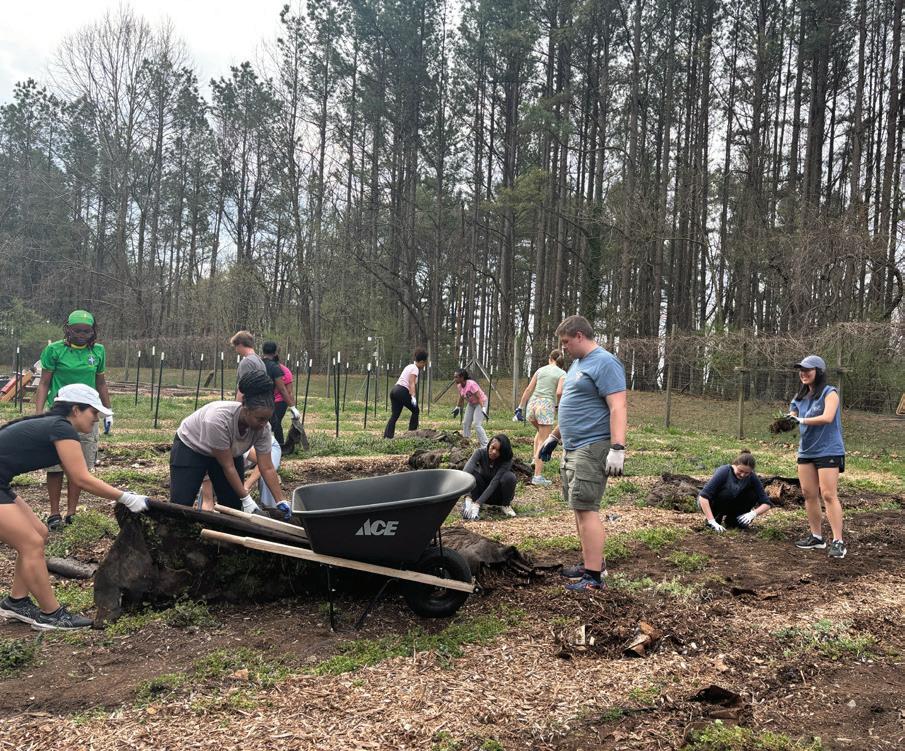
Community Engagement. Good Nabors.
Through the Good Nabors Program, NSL offers the opportunity for first-year students to intentionally commit to service in the Rockbridge community and learn and reflect on critical issues related to poverty and inequality with peers and peer mentors.
NSL sponsored volunteerism throughout the year. The annual Nabors Service Day was held in March. Students also participated in alternative break trips: serving locally over Reading Days and in Birmingham, Alabama, over Washington Break.
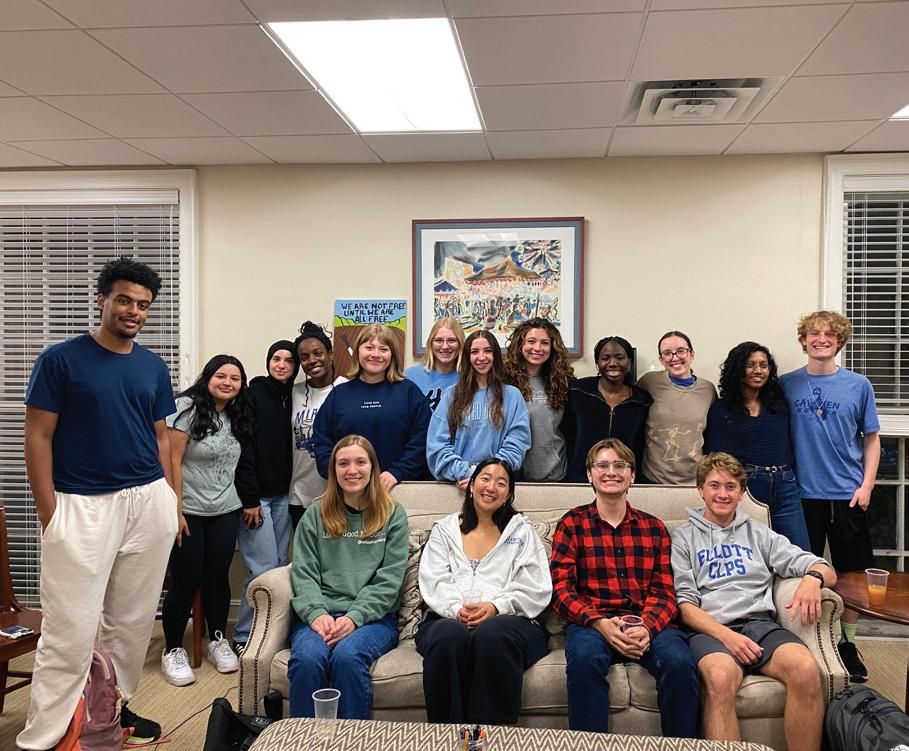
Students from across campus volunteered for Nabors Service Day, including in the back campus garden that benefits Campus Kitchen and local food pantries.
The Good Nabors cohort and mentors gathered for monthly meetings in the Mattingly Living Room.
Riley Mitchelson ’27, Alicia Gonzalez ’27 and Makane Kane ’27 distribute bananas to guests at the Grace Klein drive-thru pantry in Birmingham, Alabama.
BONNER

Community Impact.
It was really impactful to have the opportunity to assist with clean-up efforts [in Mars Hill] right alongside community members who'd grown up on that street. They told us stories of happy memories, transformation and the hardships they'd recently endured, and we connected through the simple task of sorting through mementos, stored boxes and recovered items."
—
Liv Ullmann ’25
W&L’s Bonner Program is an initiative of the Corella and Bertram F. Bonner Foundation and the Shepherd Program. Bonner Scholars are committed to working alongside communities to develop as professional and civic leaders, foster relationships, cultivate community, and work to create increasingly compassionate systems.
Bonners serve in internship-style community partnerships for 8-10 hours per week throughout their time as a student and complete at least one summer of service. In addition to the professional development offered by these opportunities, students participate in a credit-bearing academic developmental model that is rooted in the poverty and inequality studies curriculum of the Shepherd Program. Critical and creative reflection, paired with trans-disciplinary approaches to complex social issues, creates a rich landscape for exploring the problems associated with poverty and inequality and for developing a purposeful civic life. n
Bonner Programming.
The highlight of my college experience has been the work I have done with the Bonner Program, specifically with Campus Kitchen. My favorite aspect of volunteering with Campus Kitchen is the meaningful connections I’ve built with fellow volunteers and community members. Through Campus Kitchen’s partnerships with various organizations in Rockbridge County, I’ve gained valuable insight into the multitude of ways food insecurity can be addressed while promoting dignity.”
— Gibson Ward ’27

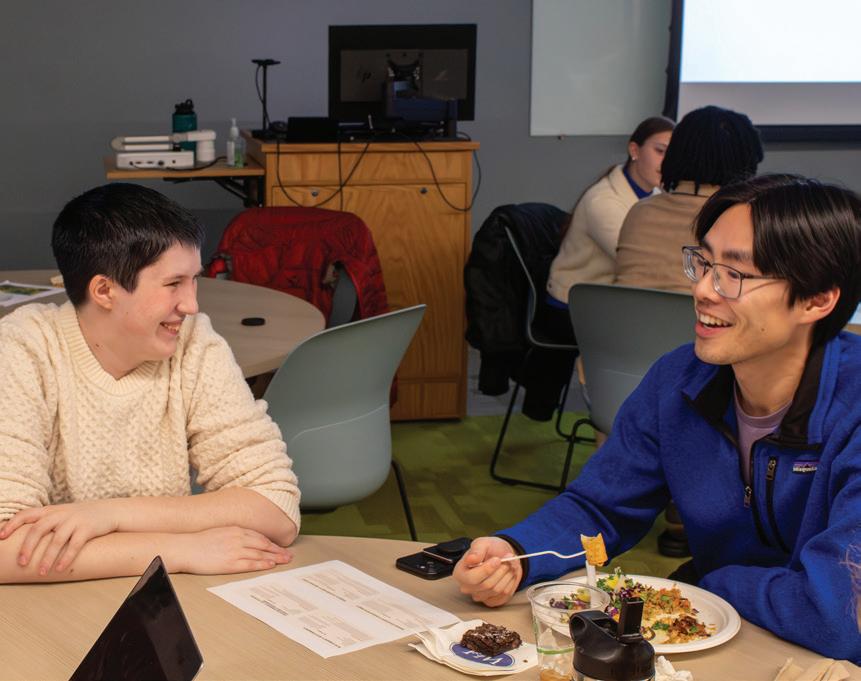
Bonner Highlights.
This year, W&L Bonners had the opportunity to travel to Mars Hill, North Carolina, to support our fellow Bonners at Mars Hill University and their surrounding community in the aftermath of Hurricane Helene. Bonners served together with their Mars Hill peers and had an evening of reflection and games. It was a meaningful experience for all involved, and we look forward to remaining connected to this community for a long time. Additionally, Sophomore Bonners traveled to the Active Citizens Conference at William and Mary in Williamsburg, VA to engage in active learning workshops, participate in panel presentations, and deepen their connections to engaged scholars at other schools across the state.
Sophomore Bonners attended the Active Citizens Conference at William and Mary.
Leandro Laperne ’28, Joy Olatunbosun ’28, and Reese Nelson ’28 pose during their volunteer work in Mars Hill, North Carolina.
Shannon Tozier ’25 and Daniel Lu ’26 connect at a Bonner Program dinner.
SHEPHERD INTERNSHIP PROGRAM
Number of participants: 43
Chris Smith ’26
During the summer after my sophomore year, I was given the opportunity to intern at the Roanoke City Public Defender in Roanoke, Virginia. My time there was nothing short of amazing and eyeopening. Before starting my internship, many people I knew wished me luck, told me to be careful and asked why on earth would I choose to work helping “bad people.” All everyone thought about public defenders was that they were unable to get any other legal job and that all the clients were horrible humans. This was not the case whatsoever.
On my first day, my boss took me to the Roanoke City Adult Detention Center to meet with a client recently found guilty of murder. We went there to ask the client if he wanted to appeal his verdict, and I expected a grizzled man to be sitting across from me. Instead, I saw a young man, not much older than me, with a soft
The Shepherd Program internships provide students with opportunities to complicate their understanding of the causes and consequences of poverty and inequality in ways that respect the humanity of all people through eightweek summer internships. While students approach the experience with an eye toward professional development, it is equally important for them to understand that important lessons are learned outside the internship experience and will come in ways they least expect.
Shepherd internships are located in various urban and rural sites in the United States and globally, with a focus on education, health care, legal services, housing, hunger, social and economic needs and community-building efforts.
Many W&L students intern through the Shepherd Higher Education Consortium on Poverty (SHECP). Additional students support local organizations in the Lexington area, participate in international internship programs or propose internships in communities across the United States. n
expression. We shook hands, and he said he wished he had gone to college and done something similar. The next day, as I walked to work, I knew public defense was my calling.
Over the rest of my internship, I met with many “criminals,” with many drug possession cases and assaults to the point where I know the code by heart. I saw one common denominator in all of these cases: a lack of opportunity. I was lucky to be born into a family nearly untouched by the throes of inequality and poverty, but these people weren’t. They were simply trying to survive, trying to find something other than the pain of being impoverished and trod upon by society. I found my place among my coworkers and their clients. The attorneys were dedicated to the cause of legal representation for all, and the clients served as a reminder of why we must do what we do. My main takeaway from that summer is this: people matter, no matter what. n
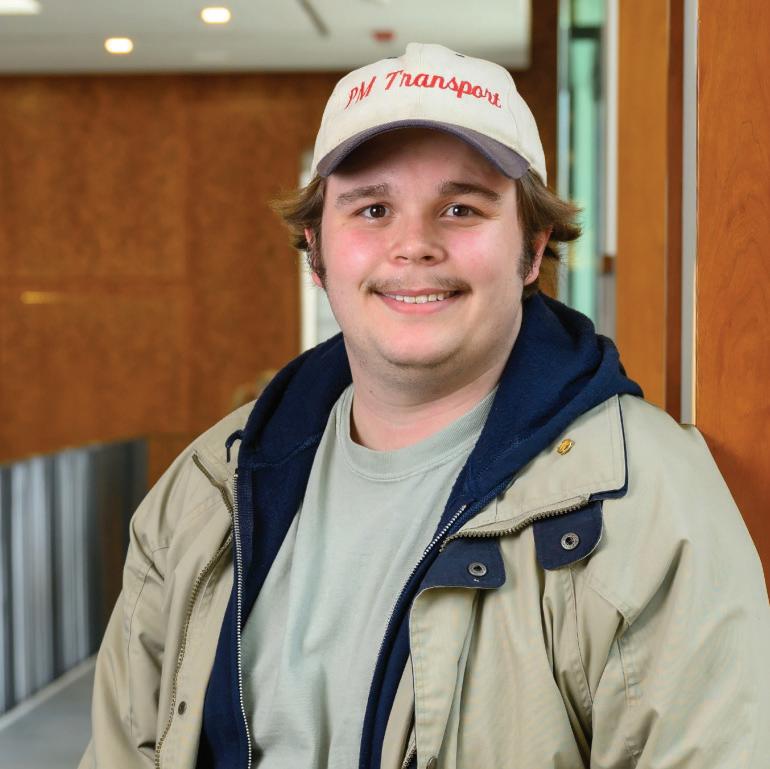
Roanoke City Public Defender SHECP
Addie-Grace Cook ’26
This summer, I stayed in Lexington to intern with Project Horizon, the only organization of its kind in Rockbridge County addressing domestic violence and sexual assault. Each morning, I began at the front desk — answering hotline calls, welcoming clients and listening. I also helped in the shelter and took on a long-term outreach project connecting with local faith and civic groups. Learning that Project Horizon began “around a kitchen table in 1982” made me feel even more proud to be part of this work.
Through this experience, I’ve gained a zoomed-in view of local legal processes that support survivors — like protective orders that offer both safety and space to heal, building upon how POV 101 taught me to understand
Rima Kumari ’26
For my Shepherd internship this summer, I taught English and math to girls at the Atoot school in Nepal. Like the eye-opening organization named Yuwa that changed my life in Jharkhand, India, Atoot uses soccer and education to help girls build confidence and self-esteem. Many of the girls face gender-based violence, child marriage, human trafficking and limited access to education. To combat these social issues, I led workshops on hygiene, friendship and team building, and helped each student create a personal storybook. Through their personal storybooks, these talented girls have illuminated their worlds with bright smiles, celebrating creativity and the joys of everyday life.
My own journey began when I started secretly going to the soccer ground behind my parents’ backs. At just
violence and vulnerability as systemic issues, not isolated incidents. After previously interning for Senator Tim Kaine in D.C., I now see both national policy and local care as essential parts of justice. W&L prepared me with writing and research skills and showed me how to be curious and not accept easy answers.
Outside of work, I ran a 47-mile trail across Rockbridge County, and my friends and I called it our “Summer of Awesome” — full of rivers, fireflies, drive-ins and slow sunsets. But more than that, the summer deepened my commitment to confronting social inequity. It reminded me that justice work starts in the communities we call home — and that here in Lexington, the pieces fall into place. n

10 years old, I saw how Yuwa’s girls — respected after playing in an international tournament — were no longer expected to marry young. That vision helped me resist the life I was “supposed to live” and inspired me to pursue education despite resistance from my family and community. I paid for my own schooling by coaching soccer and recruiting new players. It wasn’t just convincing my parents; the full society was against education.
Now at Washington and Lee, I’m majoring in economics and environmental geoscience with a minor in poverty and human capability studies. My summer experience in Nepal reminded me that what I say is not just my voice but represents the voices of so many other girls. I’m proud to be mapping my own life now and helping others do the same. n
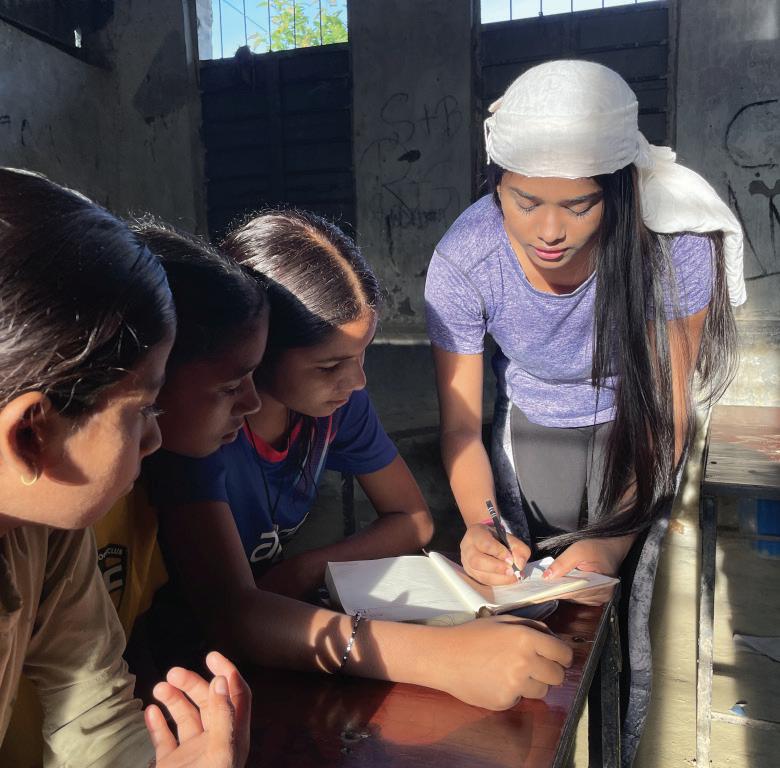
2024
INTERNSHIPS
Student Internship Partner
Leela Addepalli '25
Adhip Adhikari '27
Melos Ambaye '25
Elizabeth Barr '27
Meagan Baxley '26
Lydia Bowersox '26
Darby Burgett '26
Evan Clark '26
Addie-Grace Cook '26
Allie Cyr '26L
Maddie David '27
Sydney Devory '26
Cece Eklum '26
Hanora Finnegan '27
Judy Gong '27
Lydia Harvey '27
Ruthie Hay '26
Rebecca Hoffman '26
Brian Kim '26
Rima Kumari '26
Darcy Leight '27
Madison Lilly '25
Daniel Lu '26
Nimisha Mikkinani '27
Leyti Ndiaye '26
Saaraim Nunez '27
Olaide Olatunbosun '26
Caroline Penfield '26L
Diane Pierre-Louis '26
Reagan Radocesky '26
Natalie Richards '26
Emmy Richey '26
Emily Scaff '27
Ryan Scott '25L
Madison Shelton '27
Siya '27
Chris Smith '26
Location
Kanawha County Public Defender Office* Charleston, WV
Geeta Meta Secondary School
Baking Bread for Peace (Remote internship)
Kathmandu, Nepal
Addis Ababa, Ethiopia
Centro Educativo Rodriguez Tamayo Merida, Mexico
Rockbridge Area Relief Association Lexington, VA
Selinsgrove Regional Engagement Center Galway, Ireland
Legal Aid of West Virginia* Charleston, WV
Chile Derechos High School Santiago, Chile
Project Horizon Lexington, VA
Staunton Public Defender Office Staunton, VA
Community Justice Center* Wilmington, NC
Church World Service* Greensboro, NC
Free Clinic of VA* Lynchburg, VA
Campus Kitchen at W&L Lexington, VA
On Point for College* Utica, NY
Henry County Health Dept
New Castle, IN
Agape Youth & Family Center Atlanta, GA
American Heart Association of Dallas: Children's Advocacy Center Dallas, TX
Campus Kitchen at W&L Lexington, VA
Atoot: Girls Soccer, Education, and Empowerment
Foundations Community Partnership
Sudhdodhan Gaunpalika, Nepal
Doylestown, PA
New River Valley Community Services Blacksburg, VA
On Point for College* Utica, NY
Campus Kitchen at W&L Lexington, VA
The Lisbon Project Lisboa, Portugal
Center for New North Carolinians* Greensboro, NC
Family Services of Roanoke Valley* Roanoke, VA
Fairfax County Public Defender Office Fairfax, VA
Kjethimpilo
Cape Town, South Africa
Mabadiliko CIC London, England
IBU Movement Charleston, SC
Tapistri Inc.* Atlanta, GA
Rockbridge Area Relief Association Lexington, VA
Jefferson County Pubic Defender Office
Jefferson County, AL
Big Bend Cares Tallahassee, FL
Grameen Bank
Dhaka, Bangladesh
Roanoke Public Defender Office* Roanoke, VA
Vanshika Sood '25
Lex Thompson '27
Sandrine Uwantege '27
Gibson Ward '27
Austin Winslow '26
Internships Continued...
UDAAN: Parents & Guardians Society of Special Children of Shimla, H.P.
Bradley Free Clinic*
Shimla, India
Roanoke, VA
Habitat for Humanity Lexington, VA
Church World Service* Greensboro, NC
City Harvest London London, England
*Indicates SHECP Internship
SHEPHERD ALUMNI IN ACTION
The Social Impact Careers Summit, held in November, featured a keynote from Doug Ammar ’89L with Georgia Justice Project and three alumni panels: Personal Care & Community Well-being; Public Interest Law; and Health & Social Impact. The summit also featured opportunities for personal connection between students and alumni. n
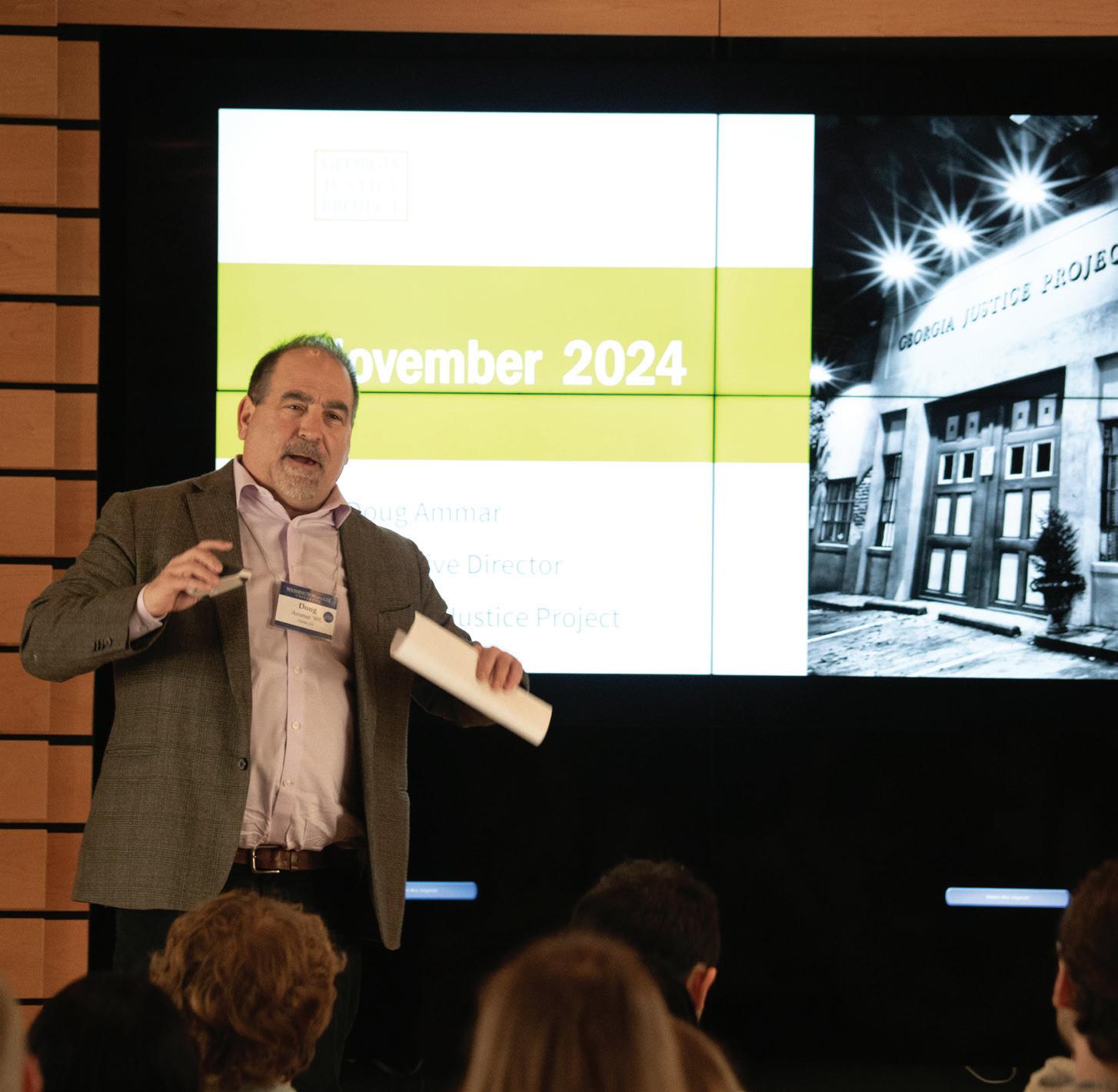
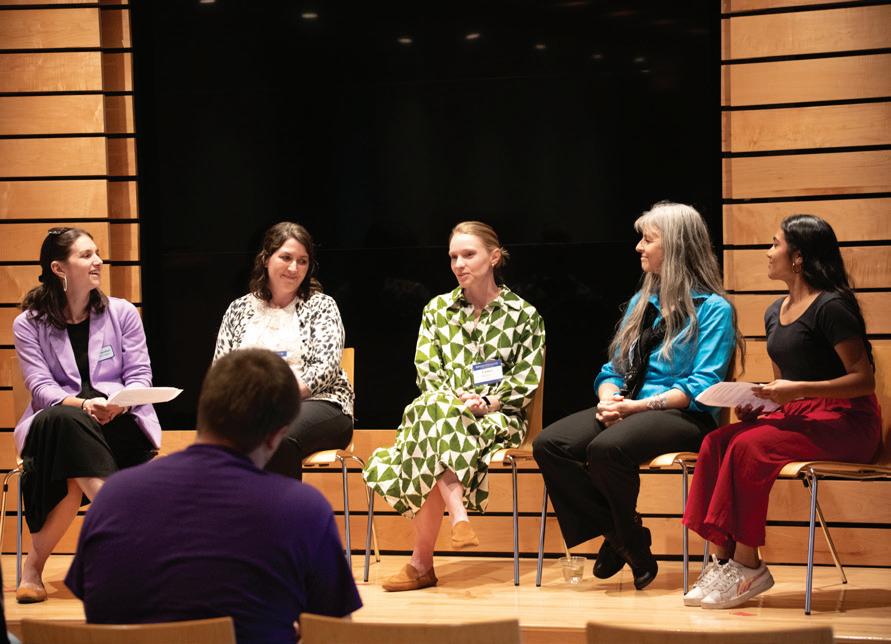
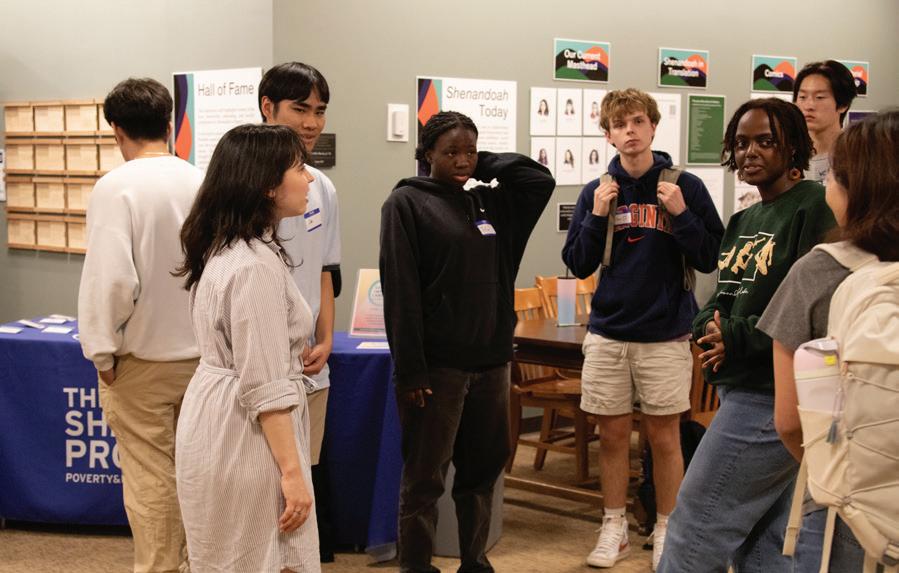
Doug Ammar ’89L focused his keynote on the work of the Georgia Justice Project.
The Personal Care & Community Well-being featured Caroline Morris ’10, Lainey Johnson ’16 and local community partner Tasha Walsh. The panel was moderated by Avani Kashyap ’25 and Jenny Davidson ’08.
Kerriann Shabanowitz ’13, ’16L visited with students during the summit’s networking reception.

Connecting a Global Movement
Dr.
Jim Withers, founder of the Street Medicine Institute (SMI) and the founder and medical director of Pittsburgh Mercy’s Operation Safety, presented a lecture on March 26 as part of Washington and Lee University’s Mudd Center for Ethics series on “How We Live and Die” SMI is an international organization dedicated to facilitating and enhancing the direct provision of health care to unsheltered individuals and working to reach those populations to provide coordinated care. As part of his visit, Withers had the opportunity to connect with a group of students who have been working for more than a year to create a new digital map and provider directory that will help visitors to SMI’s website find networks of street medicine providers in their area.
Kristina Ayers ’25, a biology major double minoring in poverty and human capability studies and music, took on the street medicine provider mapping project as her Bonner Program capstone. The project’s origins lie in an email Marisa Charley, W&L Bonner program director and instructor of poverty studies in the Shepherd Program, sent to Withers and SMI during her POV 202 class during Winter Term 2023. Charley told them she has shown the organization’s documentary, “One Bridge to the Next,” to every class she has taught. After connecting with the organization, Charley committed to taking on a project that would also incorporate student researchers.
The mapping project originated after Ayers and Charley met with the Street Medicine Institute’s executive director, who cited a directory of street medicine providers as a need for the organization. Initially, they expected to add 600 to 800 providers, but the project grew to include nearly 2,000 providers globally. As the project expanded, Ayers
By Kelsey Goodwin
eventually assembled a team of other interested students, including fellow Bonners Boris Pekar ’27, a mathematics major with a double minor in data science and poverty and human capability studies, and Alexis Thompson ’27, a neuroscience major and poverty and human capability studies minor on the pre-medical track. The group successfully created the first international database of street medicine facilities and practitioners, leading to a GISmapped resource on the organization’s website. The map will enable members and other nonprofits to better coordinate care, identify service gaps and expand their outreach efforts.
Ayers says she and Withers discussed how the tool the group created could be expanded to identify “leader” programs in more densely populated areas and how the map could be used to visualize which programs originated from these “seed” programs.
“It was so gratifying to show him the map and hear about his vision for the future of street medicine,” Ayers says. “It’s striking to observe which areas have the most support of street medicine, indicated by higher densities of street medicine practices, making it difficult to reconcile with regions with vast gaps on the map. The hope is that this points out gaps in care to open the door for new street medicine practitioners to step into those areas where need is high but service is limited or nonexistent.”
Two first-year students will join the mapping project next year, and Pekar and Thompson will continue as team leads after Ayers graduates. Pekar says the project has had a profound impact on his vision for the future.
“I am now considering a master’s in policy or public health before medical school because of this project,” he says. “Ultimately, it has pushed me to pursue a medical career in accessible medicine.” n
Marisa Charley, W&L Bonner program director and instructor of poverty studies in the Shepherd Program (second from right) and her students meet with Dr. Jim Withers (third from right) at Blue Sky Bakery in Lexington.
BOSTON, MASSACHUSETTS
Joe Landry ’13 Kerriann Laubach Shabanowitz
’13. ’16L
Supreme Court Clerk with Justice Jackson
Shepherd's robust academic, internship and service offerings allowed me to understand theories of opportunity from diverse perspectives. Participating in the program over the course of my college experience also allowed me to obtain more responsibility in my community engagement work than typical internships would have allowed. These early experiences were very helpful to me when deciding to go to law school and launching my career.
Right now, I am between jobs and taking time to be with my family. I just completed a clerkship with Justice Jackson. Before that, I worked as a trial attorney for the Department of Labor. There, we worked to enforce labor laws for all workers in the United States. This included upholding the rights of low-income workers who were denied the wages they had earned, exposed to unsafe working conditions or retaliated against for asserting their rights. n
Jonathan Wortham ’04
ATLANTA, GEORGIA
Medical Epidemiologist at Centers for Disease Control and Prevention
The Shepherd Program gave me valuable insight and perspective that continues to shape my career. As an undergraduate, the didactic courses invited me to think more broadly about the causes and consequences poverty for individuals and communities and prompted a desire for more practical experience serving people. Through two internships, I learned more about the connection between physical health, mental health, poverty, homelessness and incarceration. I chose a career in medicine and public health in order to acquire the skills to partner with people to overcome physical and mental health challenges in order to achieve their lives’ goals.
Tuberculosis (TB) control and prevention is the focus of most of my public health work. TB rates are disproportionately high among people experiencing homelessness in the United States, and TB treatment requires daily engagement with patients for months. Effective TB control and prevention involves partnering with affected people, understanding barriers they encounter obtaining medical care and empowering them to take lifesaving curative treatment.
I am thankful for Shepherd every day. After learning in the classroom, I participated in valuable service learning experiences that challenged my beliefs and showed me how difficult and complex issues of poverty and inequality are while under the care of mentors who invested in me as a scholar and as a person. n
WASHINGTON,
D.C.
Attorney-Advisor at US Environmental Protection Agency (EPA)
As a "double General," my involvement in Shepherd shaped my professional path in both my undergraduate studies and my time at W&L Law. I had the opportunity to do two Shepherd internships (one during each degree program), and they were both focused on public interest law. Those experiences, combined with the other aspects of the Shepherd Program (coursework and other interdisciplinary programming), shaped my commitment to pursue a career in public interest environmental law. I was able to see firsthand how legal advocacy and policy can shape people's lives and make a difference.
I currently work as an attorney-advisor in the United States Environmental Protection Agency's Office of Enforcement and Compliance Assurance in Washington, D.C. I work on enforcement cases under the Comprehensive Environmental Response, Compensation, and Liability Act (CERCLA), which requires polluters to pay for cleanup of hazardous substances. I remain committed to public service and public interest environmental law. n
Shiri Yadlin ’12
WASHINGTON, D.C.
Senior Program Manager at Corporation for Supportive Housing
I think I can safely say that my entire career was directly influenced by my Shepherd Internship. After spending a summer working at N Street Village, a resource center for women experiencing homelessness in D.C., I knew I wanted to continue the work of responding to and ending homelessness when I transitioned out of school and into my professional life. The Shepherd Program gave me opportunities to engage with the big questions I was interested in while still in school and set me up with both the knowledge and skills needed to make my way into the career path I was most passionate about.
More than a decade after graduating from W&L, I still work in the homelessness and affordable housing space. I started my career as a direct service case manager, working alongside people experiencing homelessness seeking permanent housing opportunities, and I now support organizations creating those housing opportunities through coaching, training and other technical assistance. Stable, affordable housing is a critical piece of any effort to address poverty and inequality, and there is a lot of work to be done!
No matter the role I have held in my career so far, I have always felt the influence of the Shepherd Program. The values and experiences have stuck with me, and I'm confident that will remain true wherever my career takes me. n
SHEPHERD ALUMNI MENTORS
Shepherd is—and always has been— special because of the people involved! The connections and community here are invaluable to what we do and why we do it. In the Shepherd Alumni Mentor Program, our goal is to make and maintain meaningful connections that provide encouragement, advice, opportunities, and enjoyment, especially during life’s transitions from college to career, from one career to another, and beyond. The program creates a supportive community of alumni and community partners with a shared interest in living out the Shepherd mission through their professional and civic lives. n
Shepherd Alumni Mentors Shepherd Graduates
Hannah Denham ’20
Alvin Thomas ’14
Sonia Siu ’07
Jamila Seaton ’09
Kelton Buchanan ’13
Noelle Rutland Camp ’17
Jonathan Wortham ’04
Yashna Naidu ’15
Kelli Jarrell ’12
Elizabeth Mugo ’19
Mason Grist ’18
Matt Lubas ’18
Leah Gose ’15
Jackson Roberts ’19
Stephanie Schaefer Harman ’10
Dave Foster ’98
Nicole Gunawansa ’14
Joe Gannett ’12
Melos Ambaye
Kristina Ayers
Ben Bankston
P Barnes
Eric Bazile
Georgia Bernbaum
Avani Kashyap
Madison Lilly
Lizzy Nguyen
Alexis Park
Amanda Romano
Alec Sirois
Shannon Tozier
Liv Ullmann
Jeniffer Ventura
Trip Wright
Sofia Zarazua
Quinlin Zunk
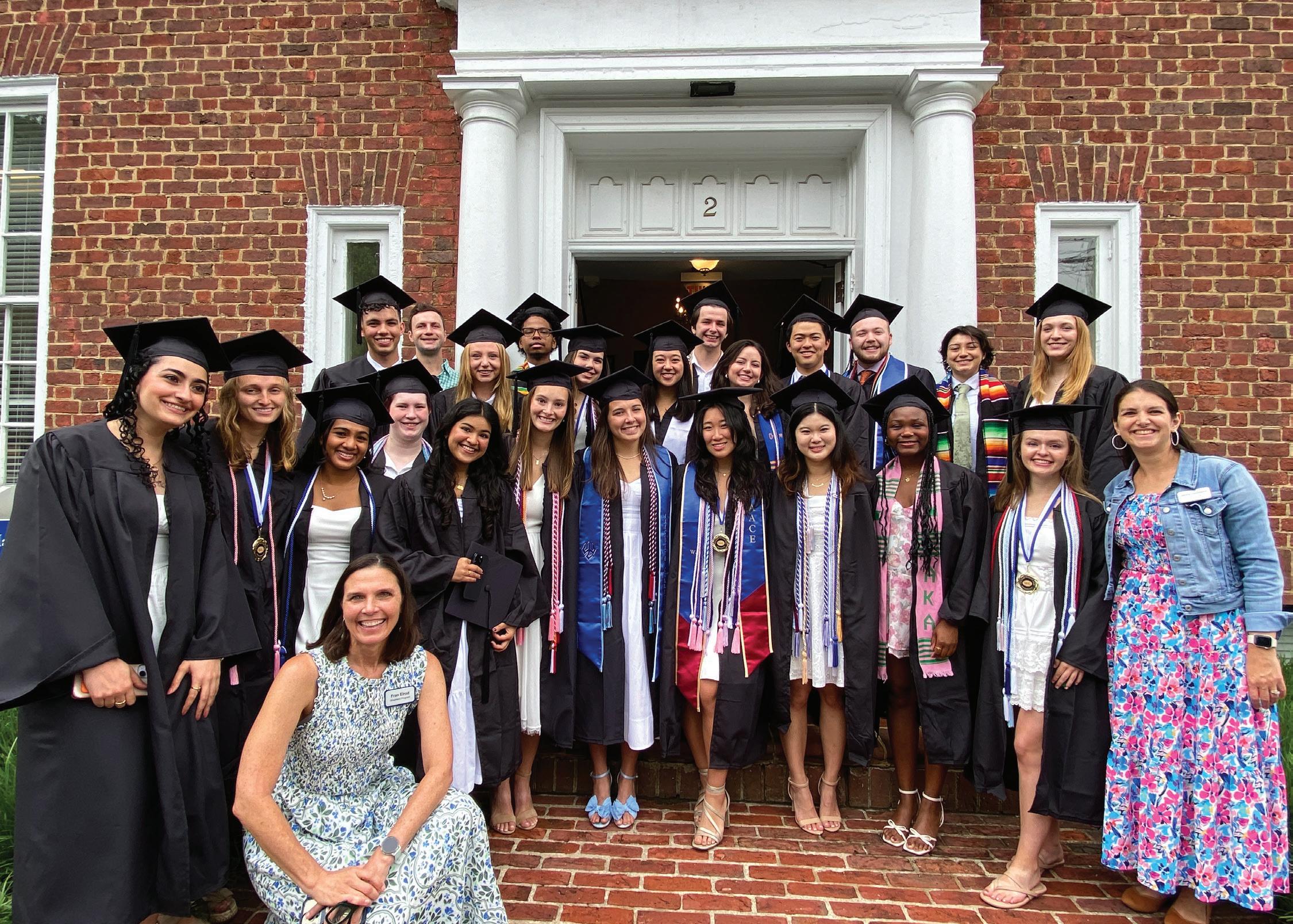
Commencement 2025
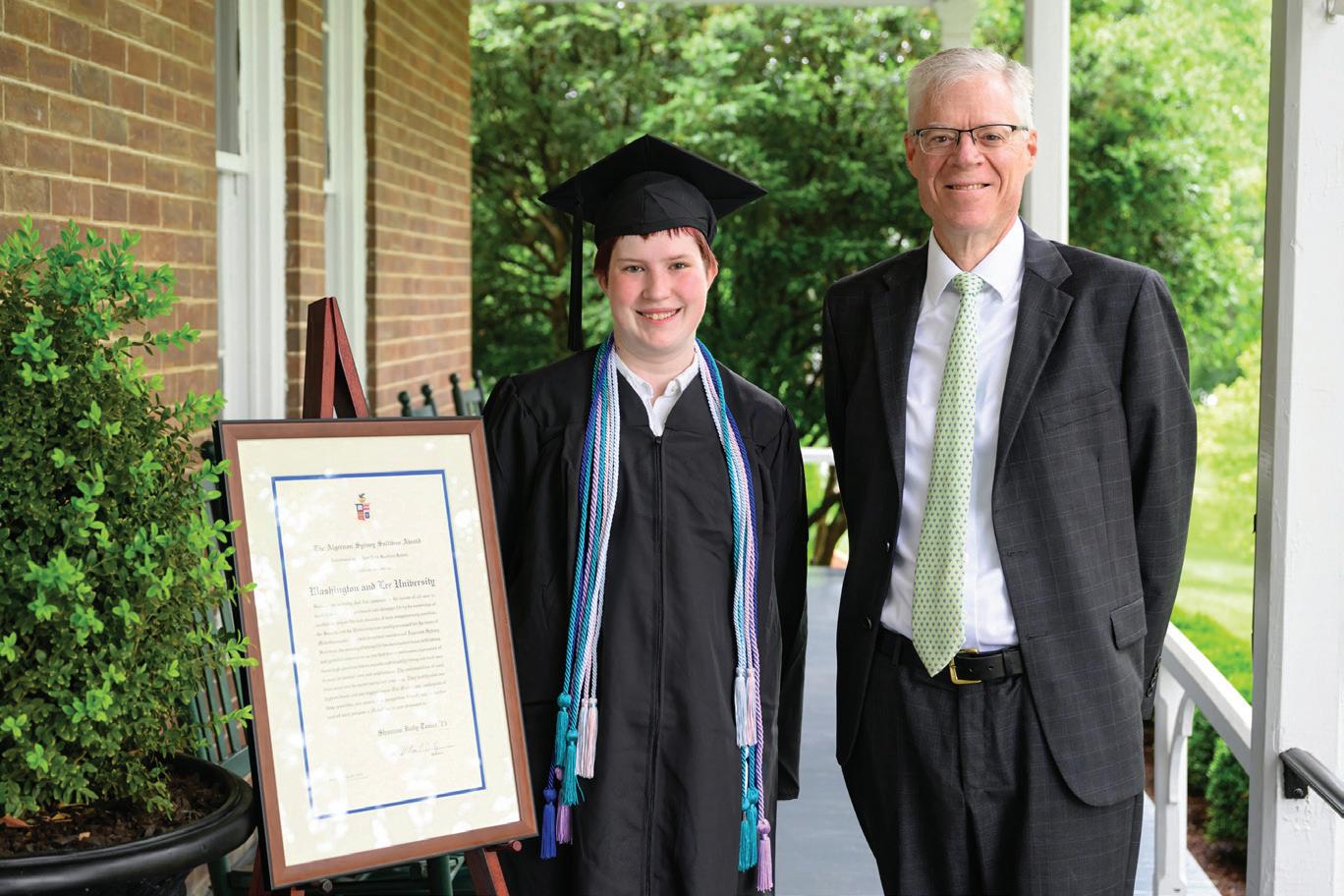
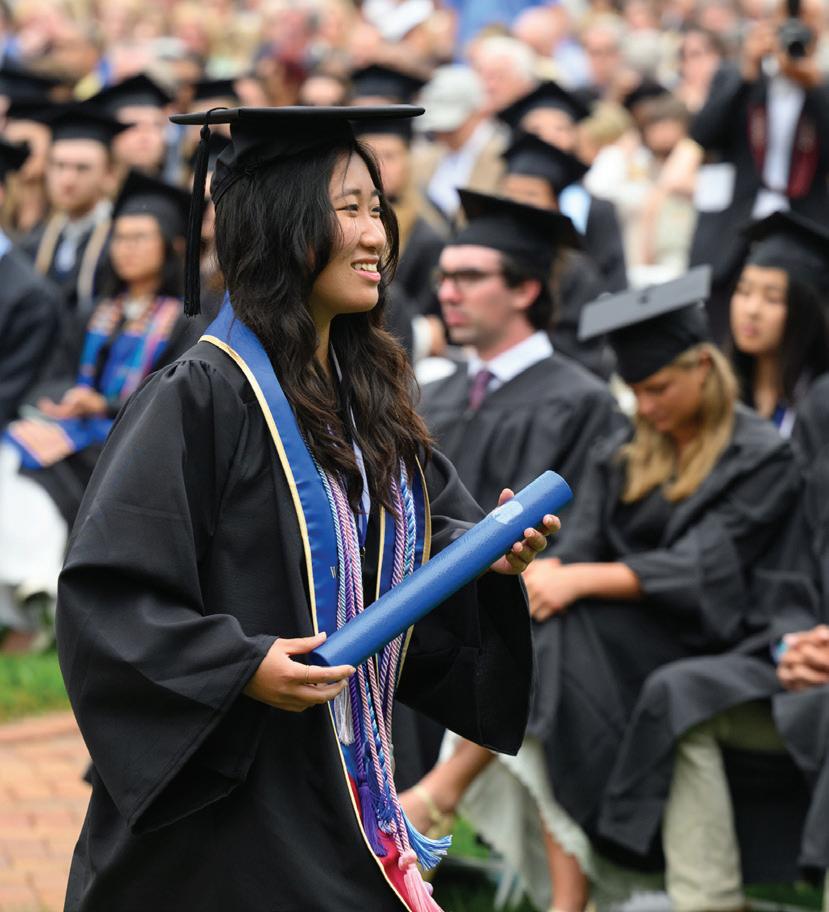
Shepherd student Shannon Tozier ’25 receives the Algernon Sydney Sullivan Award for excellence of character and service to humanity from President Will Dudley before Baccalaureate 2025.
Shepherd student Lizzy Nguyen ’25 after receiving her diploma.
Shepherd graduates pose in front of the beloved Mattingly House.
SHEPHERD CORE MEMBERS

Melina Bell Professor of Philosophy and Law
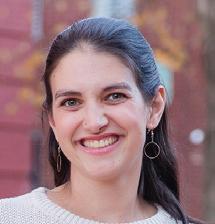
Jenny Davidson Associate Director Instructor of Poverty Studies

Art Goldsmith Jackson T. Stephens Professor of Economics
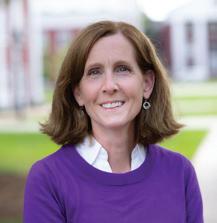
Karla Murdock
Jo M. and James M. Ballengee Sr. Professor of Cognitive and Behavioral Science

Candice Robinson Assistant Professor of Sociology
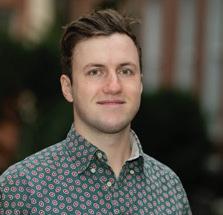
Ryan Brink Assistant Director Campus Kitchen Coordinator
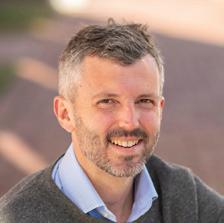
Jon Eastwood Professor of Sociology
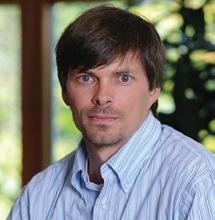
John Guse John C. Winfrey Professor of Economics
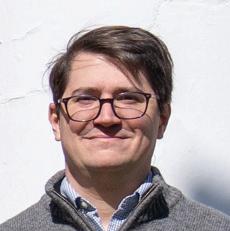
Marcos Perez Associate Professor of Sociology
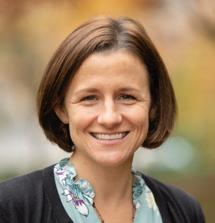
Katie Shester Professor of Economics
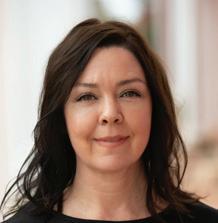
Erin Taylor Associate Professor of Philosophy

Marisa Charley Associate Director Bonner Program Director Instructor of Poverty Studies

Fran Elrod Associate Director Instructor of Poverty Studies
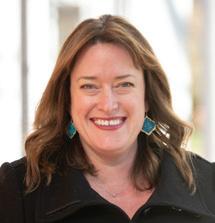
Molly Michelmore Professor of History
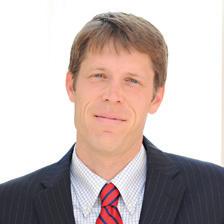
Howard Pickett Director of the Shepherd Program; Professor of Ethics and Poverty Studies

Alexander C. Sutton Assistant Professor of Sociology
ADVISORY BOARD
Charles Allen ’99 (2025) Washington, D.C.
Tyra Barrett ’18 (2028) Atlanta, Georgia
Bethlehem Dammlash ’06 (2025) Washington, D.C.
Samara Gibbs ’10 (2028) Memphis, Tennessee
Leah Gose ’15 (2025) Los Angeles, California
Mason Grist ’18 (2025) Washington, D.C.
Kelli Jarrell ’12 (2027) Cincinnati, Ohio
Melissa Medeiros ’09 (2026) Washington, D.C.
Elizabeth Mugo ’19 (2025) Ann Arbor, Michigan
Kelly Nichols ’00 (2028) Austin, Texas
Maisie Osteen ’14L (2028) Richmond, Virginia
Jamila Seaton ’09 (2026) Green Bay, Wisconsin
Kerriann Shabanowitz ’13, ’16L (2025) Burke, Virginia
Ex Officio Members
Duke Cancelmo ’80 * Houston, Texas
Paul Youngman
Interim Dean of the College and Professor of German
Nancy McIntyre
Senior Philanthropic Advisor, University Advancement
The Shepherd Advisory Board Welcomes New Members
Dave Foster ’ 98
Stephanie Schaefer Harman ’10
Shirley Keating ’17
Joe Landry ’13
Natasha Lerner ’13
Alvin Thomas ’14
Madison Sanders ’16 (2027) Athens, Georgia
Kiki Spiezio ’17 (2027) Boston, Massachusetts
Christopher Washnock ’12 (2026) New York, New York
Isaac Webb ’13 (2028) Washington, D.C.
Morten Wendelbo ’12 (2025) Åbybro, North Jutland, Denmark
Shiri Yadlin ’12 (2024), Chair Washington, D.C.
* Former Board Chair
John Nolan ’70* Chevy Chase, Maryland
Howard Pickett Director of the Shepherd Program
Sonia Siu ’07*, Immediate Past Chair Boston, Massachusetts
Stacy McLoughlin Taylor ’02* Philadelphia, Pennsylvania
Eric White ’74, P’10 Richmond, Virginia
Jonathan Wortham ’04* Atlanta, Georgia
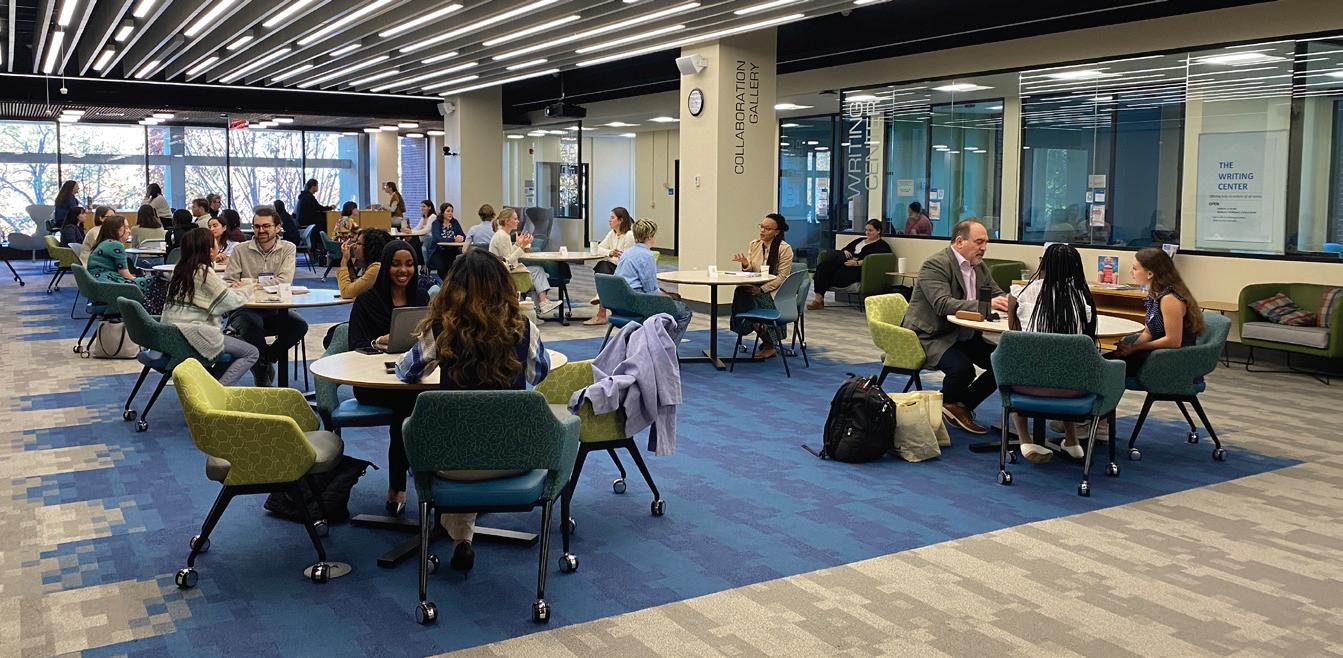
Advisory
Partnerships & Mentorship
COMMUNITY IS KEY: Recently retired Lexington Youth Services Director Tammy Dunn: top center, met at her home with Charlie Mlcek ’25: top right, Stephanie Boktor ’25: top left, Kiera Stankewich ’25: middle center, Jeniffer Ventura ’25: middle left, Jessica Pachuca ’25 bottom left, Spencer Pringle '25: bottom middle and Patrick Solcher ’26: bottom right. Dunn’s care and support has impacted multiple generations of Washington and Lee University students. In her senior Bonner reflection Boktor wrote of Dunn, “My community partner director, Ms. Tammy, has been instrumental in my journey. Watching her serve and display unconditional love towards the people she interacts with has truly been so special.”
